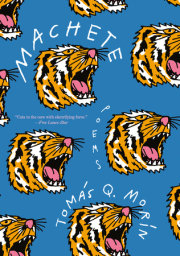I Sing the Body Aquatic
When I offer my sweaty hand in greeting
I can see the future. No matter how gently you squeeze, I know
when our hands meet you will crowd my crooked index and pinkie fingers
against their straight-as-an-arrow brothers
so that my hand looks more like a fin
than an appendage perfectly evolved
for tying shoelaces or wiping a tear
from the red face of the missionary
who rode his bicycle under the sun
all day to reach my porch.
When he takes my hand he won’t find hope
or brotherhood or whatever he’s looking for. Because I can see
the future at times like this
and because I have an unshakable faith in the law of averages, I know
when our hands embrace he’ll find
proof of natural selection
in the shape of my fingers, evolutionary
holdovers from an era of gills
when the earth was all aquarium
and some distant relative with sleepy eyes
and splayed fins who tired of being mocked by handsome carp said, To hell with it
Copyright © 2021 by Tomás Q. Morín. All rights reserved. No part of this excerpt may be reproduced or reprinted without permission in writing from the publisher.







